Survey: internationalisation of Spanish law firms
---
The Impact Lawyers publishes a survey on the internalization of several of the most renowned law firms in Spain
Through this survey, The Impact Lawyers interviews the heads of each of the participating law firms to obtain answers about the strategies undertaken and the challenges they have faced when providing their services outside the Iberian Peninsula.
In turn, the professionals interviewed defined how their firms have dealt with the challenges posed by the pandemic, an event that has affected all law firms worldwide.
Through the information compiled by The Impact Lawyers, it is possible to get an idea -even to put oneself in the shoes of the law firm itself- of the benefits that good internalization management brings to each of the firms interviewed, this being a determining factor in their development and in the strengthening of their brand on a national and international level.
GARRIGUES
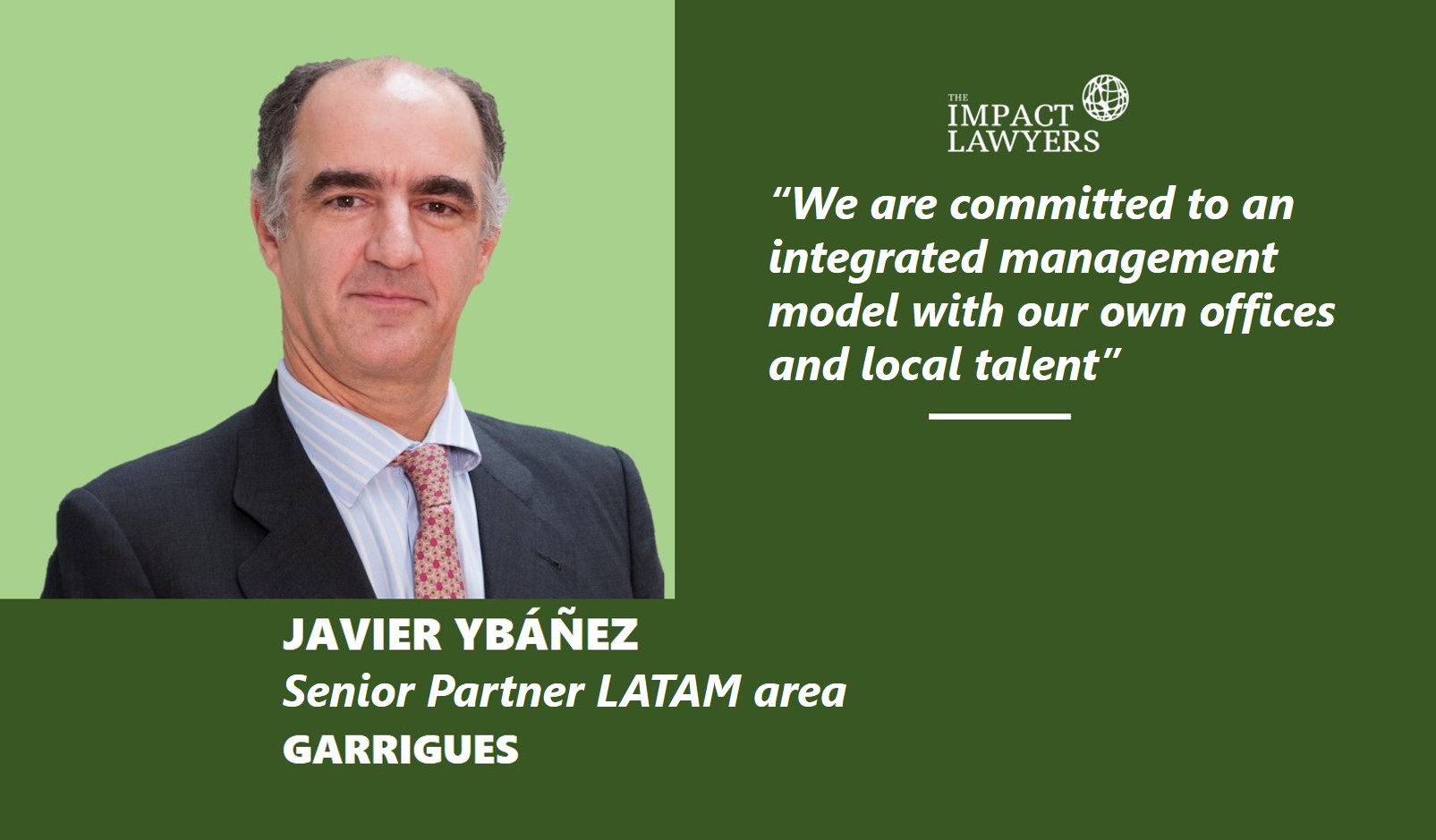
What is the strategy you have followed when opening an office abroad? Why?
We are committed to an integrated management model with our own offices and local talent. A single firm, a single partnership, a cohesive team and the same high quality standards. This is the model we have followed in our expansion in Europe, China and Morocco, and since 2013, also in Latin America, where we have built one of the most relevant direct presences in the market (offices and multidisciplinary teams in five countries), with the capacity to operate locally, regionally and internationally and a strong diversification by practice areas.
When we opted for this model, we knew that the process would be slower than other options chosen by law firms, such as alliances, franchises or shareholdings, but we wanted to be able to guarantee our clients the same way of doing things and the same quality of service, one hundred percent Garrigues. At the same time, we ensured control of operations and less complex integration between the different offices and with the organisation. Rapid integration of large teams can present major problems for organisations. Time is proving us right and the results are very positive for clients and the firm.
Whichever model you have chosen to set up in a new jurisdiction, what are the biggest challenges you have faced?
There is always the great effort of adaptation from the point of view of the law and the economic, social and cultural reality of each country. But, without a doubt, the main challenge, especially considering our model, is that of attracting and retaining talent.
We initially sought out top-level professionals who could be at the forefront of Garrigues' representation in the markets where we wanted to be, aligning our efforts to try to create a cohesive and integrated platform. We were not looking for professionals who would just bill, but who would be integrated into the Garrigues culture, while at the same time adapting our organisation to local specialities.
Then, closely linked to this, we focused on ensuring that all our professionals, both senior and junior, felt identified with the way we work, and on ensuring that they all had the same opportunities for professional development and training. It is an ongoing challenge that requires greater commitment from the whole firm, but which allows us to grow and to be able to anticipate our clients' problems.
How has the COVID-19 crisis affected your international growth strategy?
The COVID-19 health crisis has not changed the way we see things. Internationalization is a strategic pillar for Garrigues and it is clear to us that our strong diversification by country and also by practice area is an advantage when facing uncertain situations such as the one we are currently experiencing. We are therefore always evaluating the possibility of growing in other countries and increasing our capabilities. In 2020, we have strengthened our international teams, especially in Latin America, with the incorporation of new areas and professional profiles. In Peru, we launched the new competition, regulation and intellectual property area, with the recent incorporation of two leading professionals in the field, Ivo Gagliuffi and Javier Coronado; in Colombia, we incorporated lawyer Adriana Espinosa to lead the infrastructure practice. We will continue to analyse new opportunities. We believe that the current situation is favourable for firms with strong corporate cultures.
CUATRECASAS
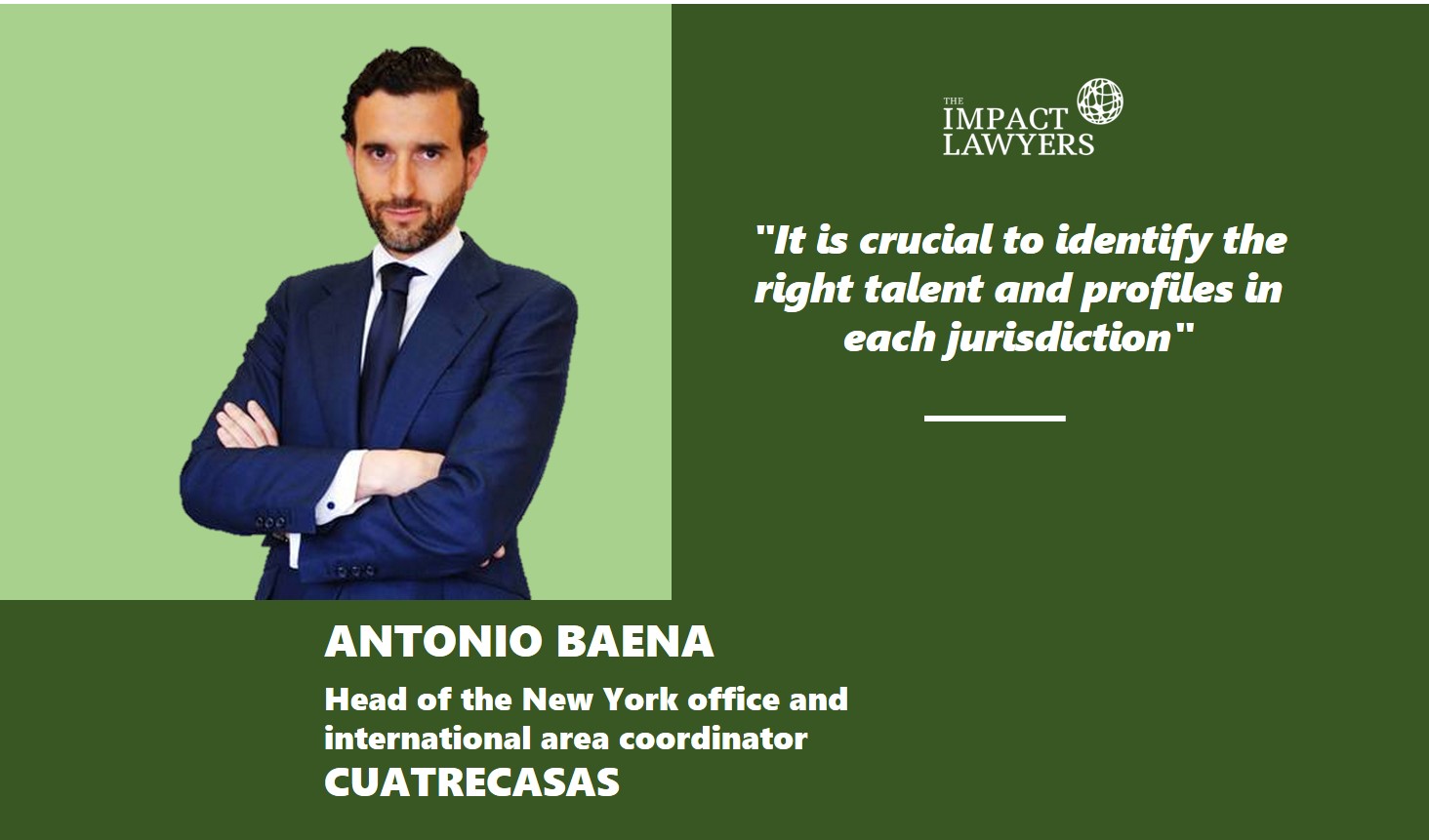
What is the strategy you have followed when opening offices abroad? Why?
To accompany our clients and establish ourselves in strategic jurisdictions and geographical areas when our operations require it, under a flexible model, adapting to the particularities of each market.
We have established offices in key locations in the international business world such as New York, London, Brussels, Shanghai and Beijing which, without practising local law, are focused on working with our existing client base, attracting new investors to our territories and collaborating with leading independent law firms.
We also have offices in North Africa (Morocco) and Lusophone Africa (Angola) to serve the needs of clients investing in those regions.
Over the past four years we have established offices in Chile, Colombia, Mexico and Peru. Latin America is a key region in our international strategy, where we do provide advice on local law and aim to become a leading firm in each of these markets.
Whichever model you have chosen to establish yourself in a new jurisdiction, what are the biggest challenges you have faced?
The current dimension of our international platform, with offices in eleven countries located on four continents, requires us to manage different needs.
It is key to identify the right talent and profiles in each jurisdiction, which allows us to always guarantee the homogeneity and uniformity of our teams.
We must also maintain our single corporate model in all territories. We must also preserve the firm's identity by transmitting the firm's idiosyncrasies and values to new offices and international teams. At the same time, adapting to local culture and practices.
It is essential to ensure consistency in the type of advice we provide in each jurisdiction, in the profile of our clients and in the quality of the service they demand and need.
Finally, it is important to continuously monitor the management of the teams, their operations and their profitability, regardless of the particularities of each territory.
How has the crisis caused by COVID-19 affected your international growth strategy?
The firm has always been clear that it had to maintain its strategy, both domestic and international, despite the difficult economic and market environment. The uncertainty caused by the crisis has made us be particularly analytical and rigorous, but it has not affected our plans and, for example, we have ended the year as one of the great dynamisers in Latin America, the region where we are now mainly focused in terms of international growth.
In this regard, our priority objective in the international sphere, which is to continue to adapt our growth in each territory to the needs of the market while ensuring the profitability of our operations, has remained unchanged. We will continue to selectively reinforce our international teams and incorporate new areas, taking advantage of any opportunities that may arise.
In any case, the impossibility of travelling has forced us to manage our international operations in a different way, always from a distance and by telematic means.
URIA
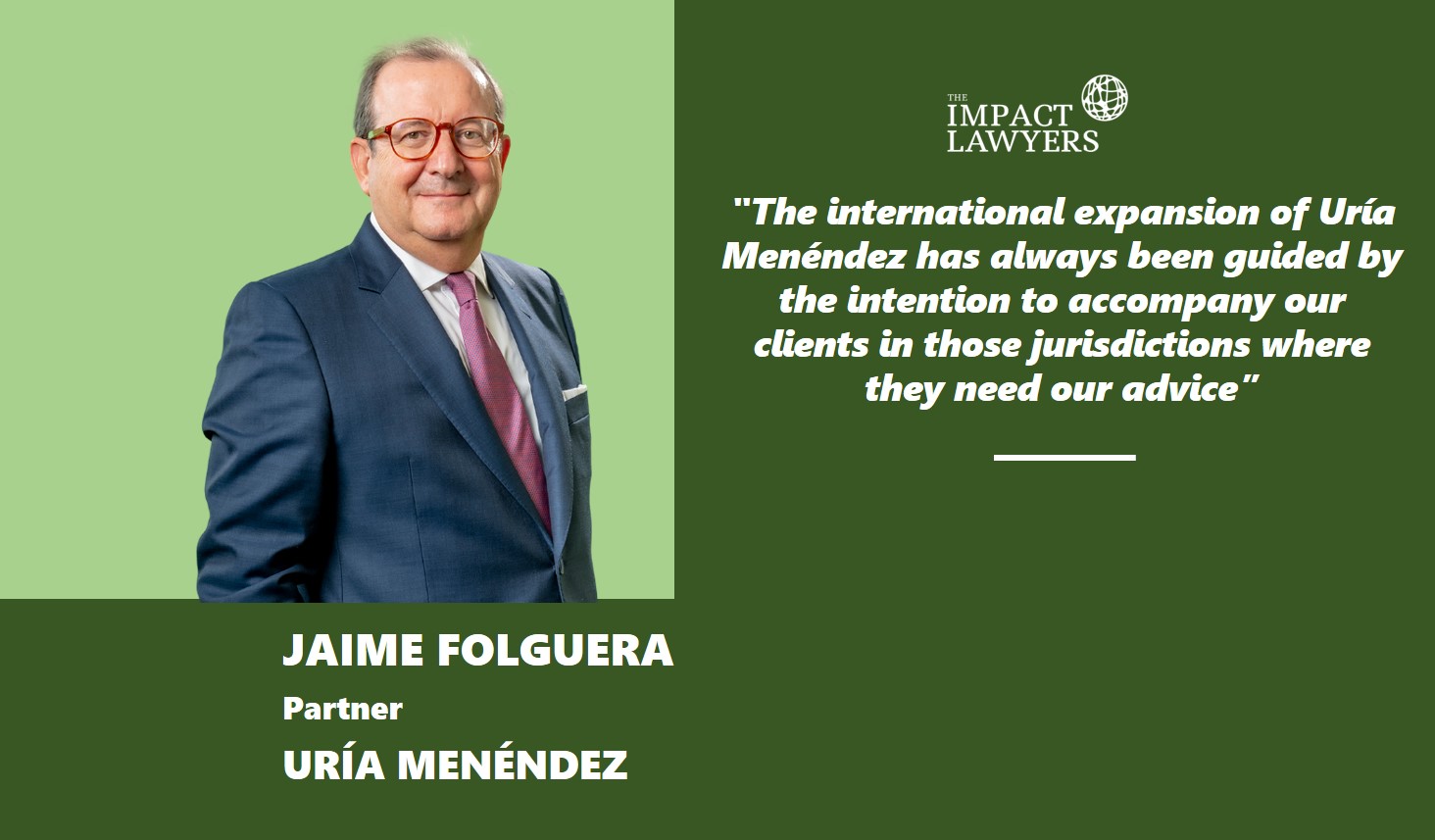
What is the strategy you have followed when opening offices abroad? Why?
Uría Menéndez's international strategy is based on three basic pillars:
1. Our natural inclination towards Latin America, firstly through PPU with our associate firm, a firm that has offices in Chile, Colombia and Peru, and the development of our Mexican, Brazilian and Cuban practice, in addition to a long experience of cooperation in other jurisdictions in the region (Argentina, Uruguay, Ecuador, Central America,...).
Our network of Best Friends offices in the main jurisdictions in Europe and Asia.
Our international capacity through our own offices in New York, London and Brussels, our participation in Lex Mundi as exclusive member in Spain, and our network of collaborating law firms worldwide.
Uría Menéndez's international expansion has always been driven by the intention to accompany our clients in those jurisdictions where they need our advice and that of the local law firms with which we have been collaborating for decades.
Whichever model you have chosen to establish yourself in a new jurisdiction, what are the biggest challenges you have faced?
There are regions such as Latin America where setting up as a Spanish law firm is easier due to cultural similarities and language, and we Spanish and Portuguese feel very welcome in these countries.
In other jurisdictions with which there are less affinities it is more difficult to establish ourselves and it is necessary to have a good knowledge of the market and the experience of having worked with local firms, which allows us to assist our clients in the best possible way in any part of the world.
How has the COVID-19 crisis affected your international growth strategy?
This health crisis has brought us closer, if possible, to our customers. We have been by their side, supporting them and informing them of the special legislative developments that have been implemented in all the countries where we have a presence and, above all, helping them to deal with the problems caused by the COVID-19 pandemic that they have encountered, and that is what we will continue to do in 2021; we will continue to be where they need us.
PÉREZ-LLORCA
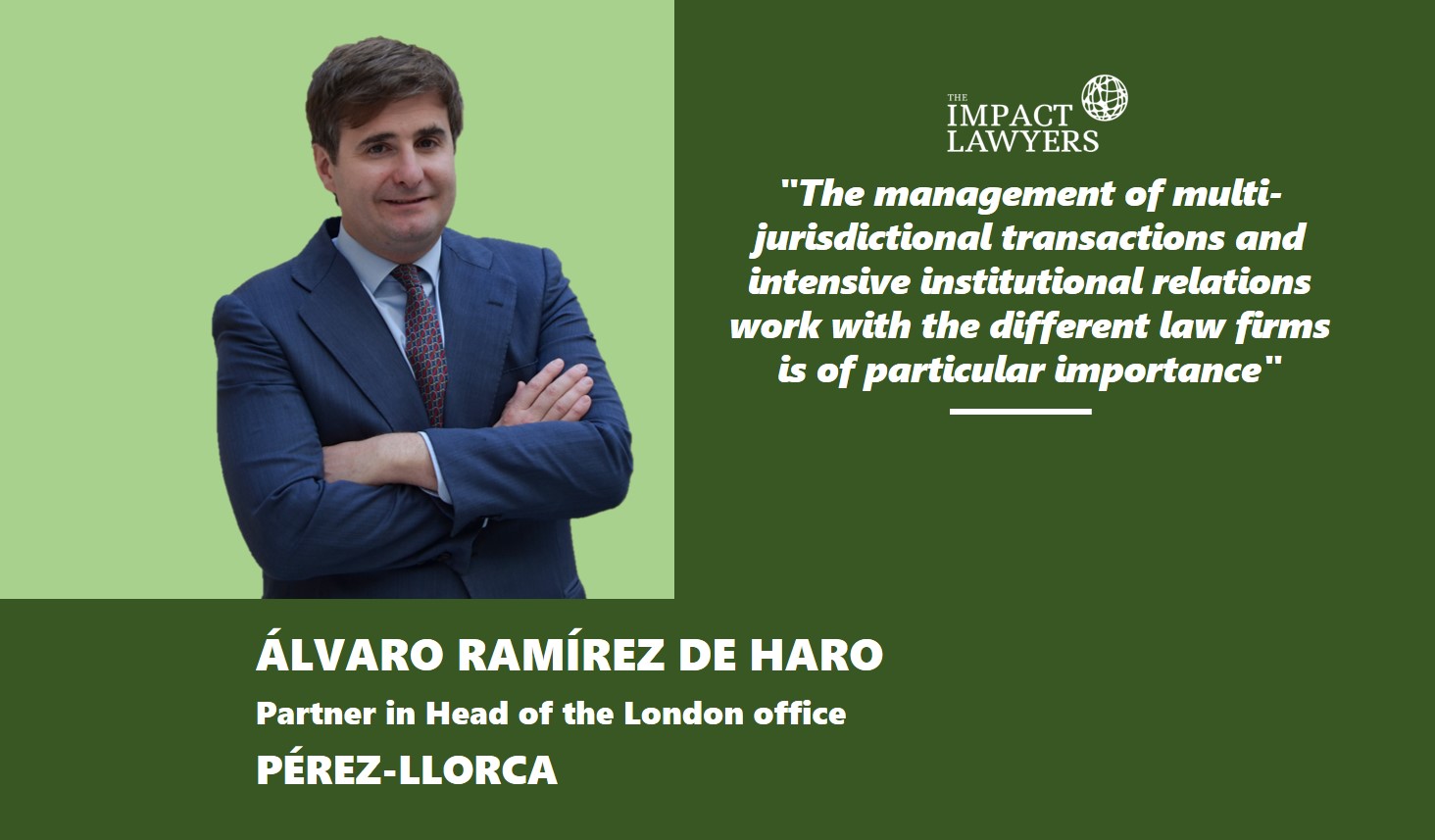
What is the strategy you have followed in opening offices abroad? Why?
The decision to expand our network of offices outside Spain is mainly motivated by two reasons. On the one hand, to accompany our clients wherever they are, wherever they operate or wherever they need us, offering them global advice and, on the other hand, to make our legal knowledge of the Spanish market available to foreign companies.
We currently have two offices: London and New York. With the first one we sought to consolidate our service offering in the Corporate and Banking areas, while at the same time strengthening our links with large investors located in London.
The opening of the New York office, on the other hand, has given us an operational centre from which to work in both the US and Latin American markets, with the aim of providing answers to many of our clients who increasingly have projects in this region and advising foreign investors on Spanish law issues.
Whichever model you have chosen to establish yourself in a new jurisdiction, what are the biggest challenges you have faced?
Anglo-Saxon markets can be very demanding, as they are more specialised and highly competitive. In this regard, the management of multi-jurisdictional operations and intense institutional relations work with the different law firms are particularly important.
Markets such as New York or London also allow us to be at the forefront of global economic and financial trends, which to a large extent can help us to anticipate certain behaviours and thus favour a more efficient response to our clients' needs.
How has the COVID-19 crisis affected your international growth strategy?
One of the main objectives of international offices is to develop new business. With the COVID-19 crisis our usual work of physical meetings with both offices and clients has been reduced, however, we have been able to adapt to the new reality and we have been close to our clients thanks to technology. Fortunately, both the United Kingdom and the United States are regions where Smart Working is very advanced and this has made it easier to adapt to such a complex situation.
It is precisely this ability to adapt that has allowed us to respond to the new needs of our clients and to continue advancing in our business plans. During these months, the areas that have grown the most have been Litigation/Arbitration, Banking and Finance, Restructuring and Insolvency, Labour and Tax. And in all of them we have been able to help our clients thanks to our specialised capabilities.
In the coming months we will see how the pandemic evolves and the pace of economic recovery in the different countries, but we hope to continue to have the confidence of our clients in order to boost our international presence.
ECIJA
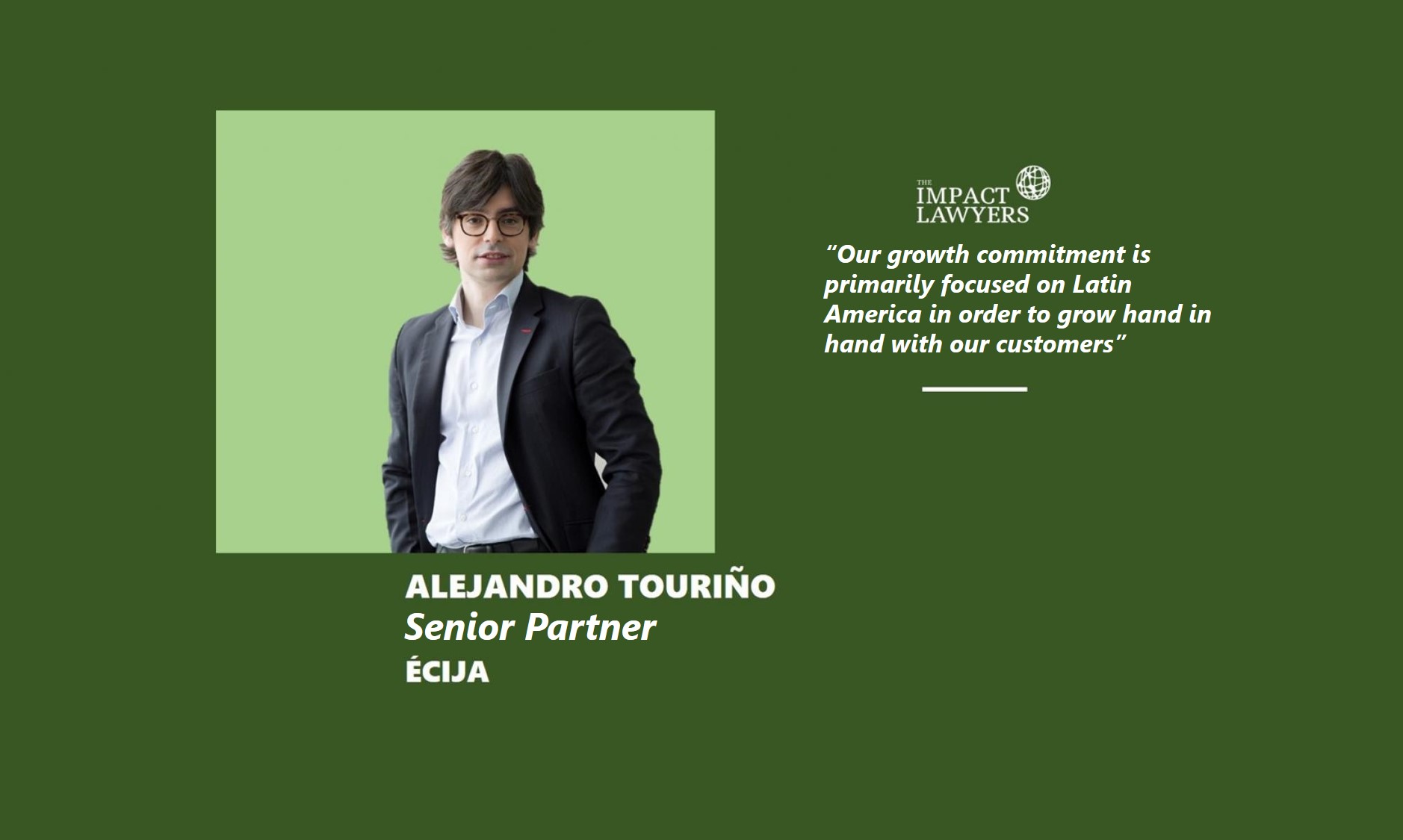
What is the strategy you have followed when opening offices abroad? Why?
Our strategy for the coming years is based on international growth, which is based on three pillars: to become one of the top five Spanish firms; to be leaders in Latin America; and to be a major reference in the legal market in the digital economy. We are aware of the complexity of achieving this, but it is an incentive for us that makes us work hard every day. There is no deadline as such, but we will not stop until we achieve it.
To this end, we have defined an innovative approach, probably unique in the Latin American market, marked by a polycentric spirit, that is, without headquarters around which the rest of the offices revolve, but through a horizontal structure of the firm where all the offices have the same weight and in which local spirit and autonomy are paramount as values. Our commitment to growth is primarily focused on Latin America in order to grow hand in hand with our clients, whose roadmap increasingly includes internationalization in the region. We aspire to be the firm of reference for many companies that see Spain as the natural gateway to the Iberian and Latin American markets.
Whichever model you have chosen to establish yourselves in a new jurisdiction, what are the biggest challenges you have faced?
We have grown a lot in recent years. The criteria for selecting firms has not been unique. However, there has always been a common element of sharing the same business vision, the same drive for growth and the same corporate culture. Our partners are a real example of diversity, but despite their differences, we all share a vocation for excellence and client service.
Integrating firms is a risk, but also a challenge. It is a kind of digestion. It is not only a matter of chewing and swallowing, but also of digesting. The culture of the firm is very strong. We are not a normal law firm. We are clearly a company, we behave that way, we have an incredible working environment, full of young and diverse talent, which makes us work and share our work with passion. For us, any corporate move has to be about reinforcing that culture.
How has the crisis caused by COVID-19 affected your international growth strategy?
Covid-19 has certainly been a challenge, but we did not want it to be a brake on our international growth. In the last financial year, we have taken up positions in three key markets for us: Mexico, Brazil and Ecuador, as well as strengthening our presence in Guatemala.
In this same context, we have not only strengthened our muscle through integrations, but we have also committed to the promotion of new partners in the offices of Brazil, Costa Rica, El Salvador, Mexico and Puerto Rico, as well as the opening of new practice areas such as Human Rights and Corporate Social Responsibility, for example.
In the midst of Covid-19 and in the midst of confinement, we have been working to enter other markets and we are confident that we will soon be able to announce our arrival in new territories as a result of the work of the last few months.
DWF-RCD
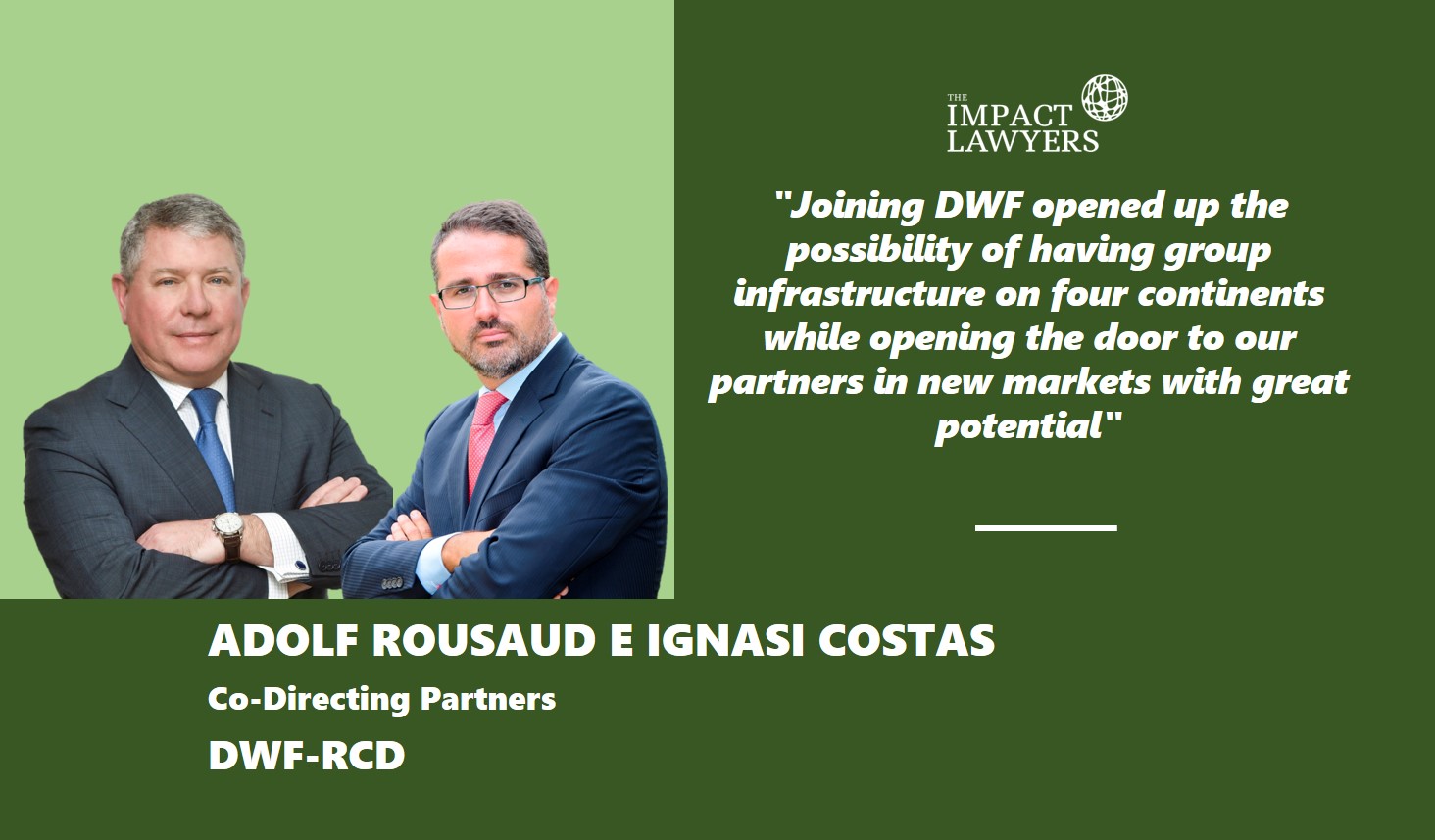
What is the strategy you have followed when opening offices abroad? Why?
In December 2019 -and after a successful period of collaboration through an exclusive partnership agreement-, we joined DWF, a global legal business with a team of more than 4,000 professionals, with a presence in 33 locations worldwide and with which the firm shared a differential vision of law, values and similar characteristics.
The integration was a natural step in our growth process, after a period in which we realised that we shared a similar philosophy, values and way of understanding law and the profession. Joining DWF gave us the possibility of having group infrastructure on four continents while opening the door to our partners in new markets with great potential.
How has the COVID-19 crisis affected your international growth strategy? And whatever model you have chosen, what are the biggest challenges you have faced?
Our integration took place just a few months before the outbreak of the COVID-19 pandemic. As happened in other law firms, this situation forced us to modify the planned roadmap in order to focus our efforts on being close to our clients and professionals, responding to their needs and adapting as quickly as possible to the new situation.
Leaving aside this exceptional situation, any integration involves the union of two gears and the need to ensure that they work in the best possible way for both our professionals and our clients. If we also take into account the fact that the integration is with an international law firm, we will have to take into account a more than likely organisational, structural and even cultural diversity, something that in our case has been an opportunity to share experiences and good practices with DWF, making the process highly enriching.
BROSETA
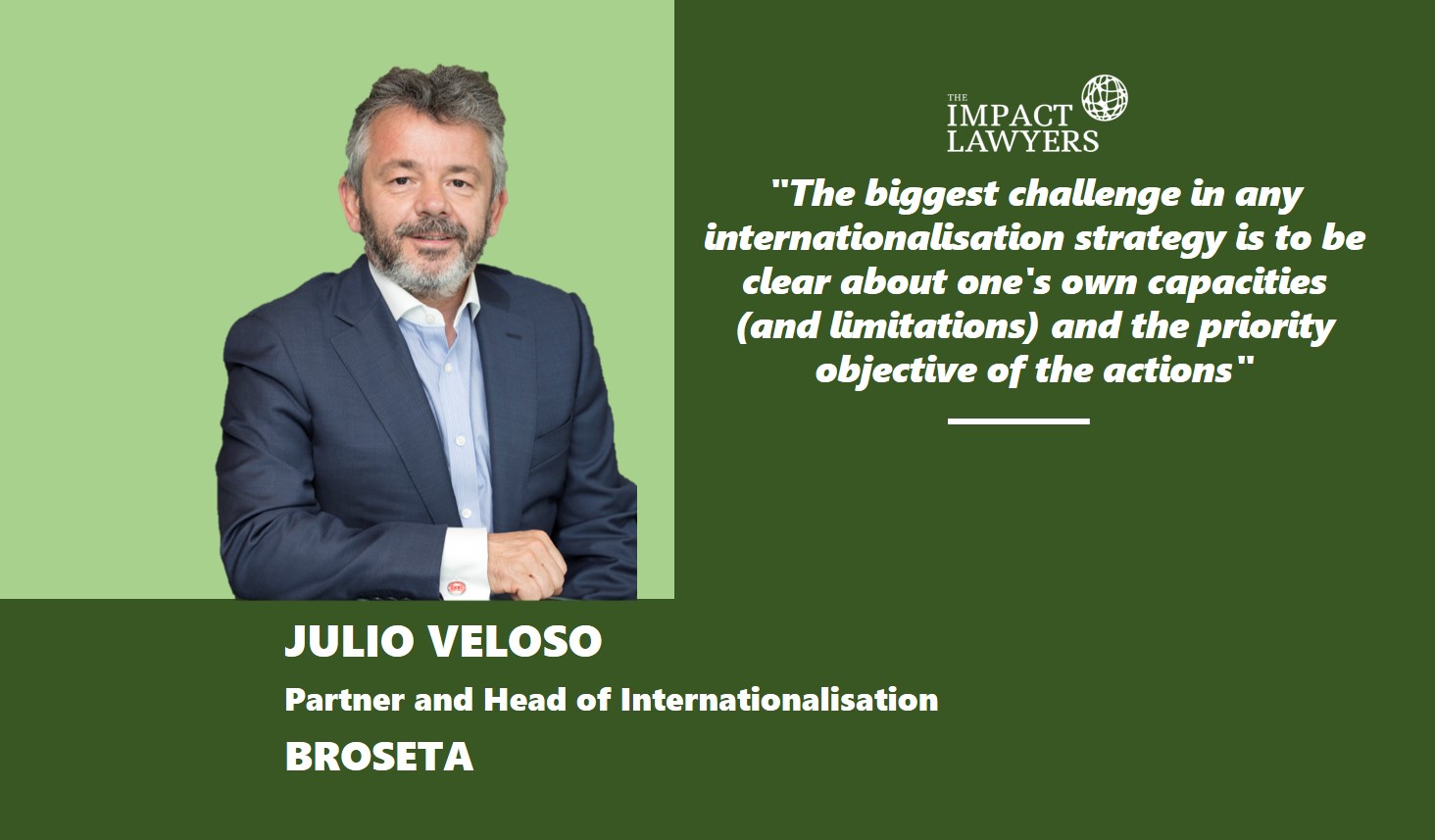
What is the strategy you have followed when opening offices abroad? Why?
BROSETA's internationalization strategy is based on two basic premises: (i) efficiency and effectiveness in customer service; and (ii) the size of our organisation at any given time. In other words, we prioritise our objective of providing a truly excellent service based on our knowledge of the jurisdictions we serve, taking into account who we are and the size and resources we have at any given time.
Taking the above into consideration, we have defined and adapted our internationalization model, which currently revolves around three axes: our own offices; alliances; and collaborations. Thus, we have our own offices in Switzerland (Zurich, since 2013) and in Portugal (Lisbon, since 2018); for almost a decade we have formed and led an alliance of Ibero-American firms, the Ibero-American Legal Network (RLI), which makes us one of the few Spanish organisations providing legal services with such a relevant and diversified presence (from the Río Bravo to Cape Horn, as well as in the Caribbean); and, thirdly, we have an intense link, in the form of collaborations and also through our own presence (by virtue of regular travel) in various European locations, mainly London and Paris.
Whichever model you have chosen for setting up in a new jurisdiction, what are the biggest challenges you have faced?
The biggest challenge in any internationalization strategy is to be clear about one's own capacities (and limitations) and the priority objective of the actions. The central axis consists of analysing one's own strengths, in order to focus the available resources, and defining the geographies where we can be most useful for our clients (either because of our own knowledge of the jurisdiction in question, our previous experience and relationships there or our ability to generate valuable relationships and collaborations in the short, medium and long term); if we get the above-mentioned issues right, we will be able to provide value to our clients and make them count on us in relation to the matters they may have in those countries. In our case, Europe (with a special focus on Portugal, Switzerland, the United Kingdom and France, and with growing activity in Germany) and Latin America are the pillars on which we currently base our international strategy.
For practical purposes, and once the "disembarkation" has been planned, the most important thing is to face the arrival in a new geography with humility, with an absolute willingness to learn continuously and knowing that we have to go hand in hand with those who truly know the market in its entirety, both in the field of business itself, as well as in personal and institutional relations, which are so important for and complementary to the business and the way of doing business in each country.
How has the COVID-19 crisis affected your international growth strategy?
To tell you the truth, we have not felt a particular impact in this regard, apart from obvious issues such as less travel and less attendance at face-to-face meetings in the various jurisdictions. In fact, 2020 has been one of the most intense years in terms of international business activity for us.
In terms of our own offices, in Portugal, for example, we have almost doubled our business volume and headcount over the past year. Thus, we now have 20 lawyers in Lisbon, four of them local partners, a turnover of more than two million euros and future forecasts that make us very excited about this jurisdiction. Switzerland, on the other hand, is an already well-established geography that also last year continued to be essential in one of the key areas for the Firm, the Private Client practice (Wealth Management).
And, within the scope of the Ibero-American Legal Network, during the past year we have notably boosted cooperation between firms at all levels (business and promotion), giving rise in this context to various relevant collaboration projects in jurisdictions such as Chile, Colombia, Ecuador and Peru. Recently, for example, we have been pre-selected, in collaboration with our Colombian colleagues from ESGUERRA, and with the invaluable help of the RLI's office in the country (NOBOA PEÑA TORRES), to participate in the project for the development of Line 1 of the Quito Metro, a milestone of extraordinary relevance for the entire RLI and, in particular, for BROSETA.
While it would undoubtedly be a magnificent start to 2021 to be selected as the winning consortium in this competition, the mere fact of having qualified as one of the short-listed consortia is in itself a remarkable success, both in light of the excellent firms that make up the short-list and the high-level candidates that have not made it this far.
RAMÓN Y CAJAL
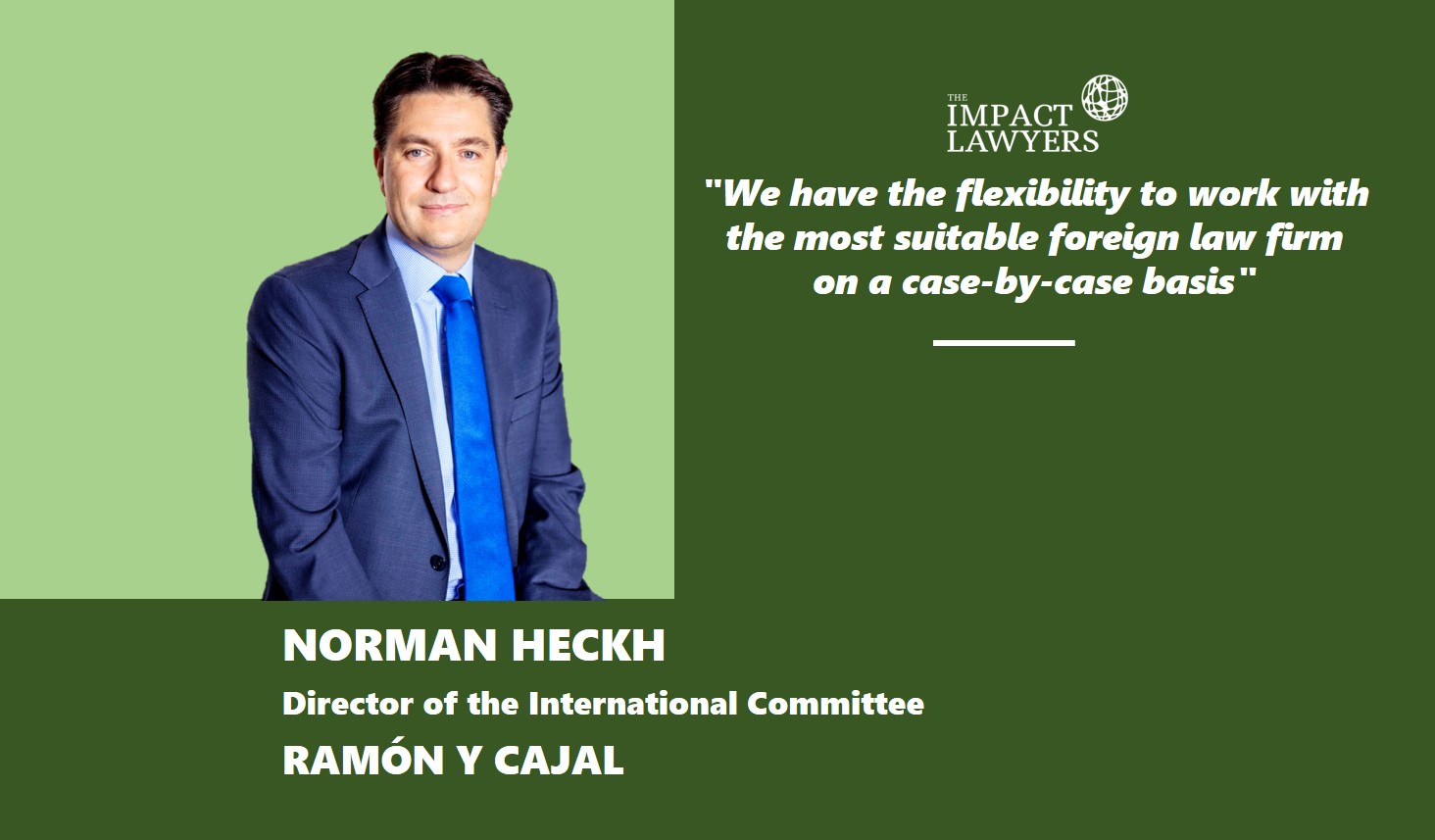
What is the firm's internationalization strategy?
Ramón y Cajal Abogados opted at the time to remain independent despite several merger/integration offers from large international firms in recent years and we want to remain so for a long time.
Independence, far from weakening us, has made us stronger, as we enjoy the necessary flexibility to collaborate with the most suitable foreign law firm depending on the specific case and these firms also appreciate our capacity to react and our ability to adjust to the circumstances required.
Thus, from our independence, we have managed to generate very good relations with other law firms not established in Spain, especially in the United Kingdom, Germany, France, Italy and to a lesser extent the USA and Canada. On the other hand, Latam has been another important region in our strategy.
Our challenge in the coming years is to strengthen our collaboration with countries such as the UK, Germany and France, and in this regard we are considering the possibility of sending one of our partners to London to strengthen our links with the City.
On the other hand, we will devote more resources and efforts to improving our "presence" in the US.
Whichever model you choose, what are the biggest challenges you have faced?
Undoubtedly the high level of competition from many national firms that have been investing heavily in their "internationalization" for a long time, and we have the example of several Spanish law firms with offices in London, Brussels, Latin America and even the USA, although in many cases they are only representative offices.
This has meant that we have had to work twice as hard to achieve similar recognition.
How has the crisis caused by COVID-19 affected your international growth strategy?
Obviously, the crisis caused by the current pandemic is affecting all sectors and the legal sector is no stranger to it. However, thanks to the good work done in recent years, the flow of international work has hardly suffered and in 2020 we have achieved an international work turnover very similar to 2019. This is mainly due to the fact that our name abroad is already very strong, to the loyalty of many international clients and to the good relationship achieved with several law firms in jurisdictions such as the UK, Germany, France and Italy.
On the other hand, restrictions on movement have made it impossible for us to continue to travel and attend relevant events and forums, although new technologies have made it possible to keep in touch, and even more regularly, with all our international contacts.
We expect to be able to resume our face-to-face activity from September 2021 onwards, without reducing remote promotion.
ONTIER
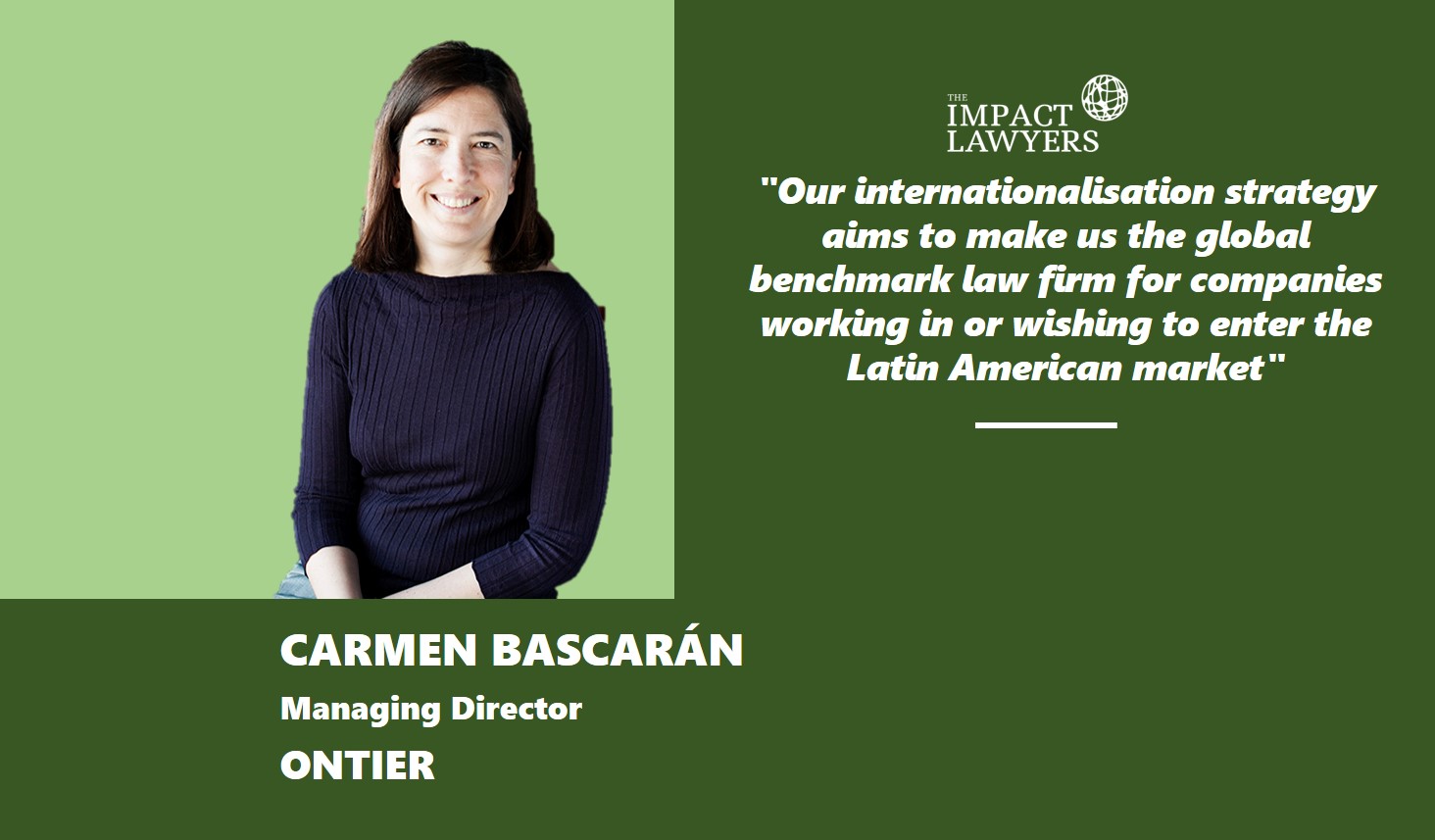
What is the strategy you have followed when opening offices abroad? Why?
ONTIER is an international and multidisciplinary law firm with a special focus on high value-added transactional advice and highly complex commercial and commercial litigation and arbitration. Our holding company is based in London and has offices in thirteen countries, 9 of them in Latin America, making us the international firm with the largest presence in Latin America and the ideal legal partner for any company with interests in the region.
We are an international firm with a unique business model and a purely entrepreneurial management, based on taking a real stake in the law firms in the different countries. A model that allows the firm to take advantage of the expertise and know-how of local lawyers and to put teams of truly global professionals at the service of our clients.
Our internationalization strategy aims to make us the global firm of reference for companies working in or wishing to enter the Latin American market.
Whichever model you have chosen to establish yourself in a new jurisdiction, what are the biggest challenges you have faced?
First of all, by creating a new internationalization model that had not been tried before in the legal sector, we took the risk that comes with innovation by trying to change the classic ways of growth in a sector as traditional as ours. For us, it was especially important to achieve a single brand, a single corporate image because of what it represented for each prestigious law firm in each jurisdiction where we wanted to operate.
ONTIER meant abandoning personal brands and believing in a project for a global firm organised as a real company, something we had very much in mind from the beginning of this adventure of expansion and growth of the firm. Resistance to change and the necessary period of adaptation so that all the countries could move at the same pace and with the same quality of service has been one of the challenges we have had to face. Something that has always concerned us, especially in transnational operations, is that the client has a single interlocutor and perceives the same style of doing things. To achieve these changes, it is necessary to work intensively with all the legal teams in the different countries, taking into account the different local cultures, languages and even time zones.
Changes that involve profound transformations in business models are the most difficult. Today, we can say that ONTIER is a consolidated brand on the international scene and a firm where the teams are always multi-country.
How has the COVID-19 crisis affected your international growth strategy?
We could say that it has affected the speed and priorities, but the strategy has not changed. ONTIER has a defined international strategy in which all the firm's international partners participate and which we adapt year after year to the increasingly changing, uncertain and ambiguous environment in which we live. COVID-19 has made us relate to each other in a different way; it has limited our travels, which have been replaced by virtual communications. More than ever in these months we have been able to feel the pride of belonging and the need to support each other regardless of nationality. This crisis has demonstrated the resilience of our business model, as in 2020 we have been able to consolidate the firm's trajectory and results.
In any case, and regardless of the pandemic, what is certain is that we have had a few years of intense investment with the incorporation of various countries to the project. We are now in a new stage in which the different offices are already enjoying significant solidity and in which it is time to "grow inwards", consolidate structures, ways of working, multidisciplinary and multicultural teams.
BARRILERO
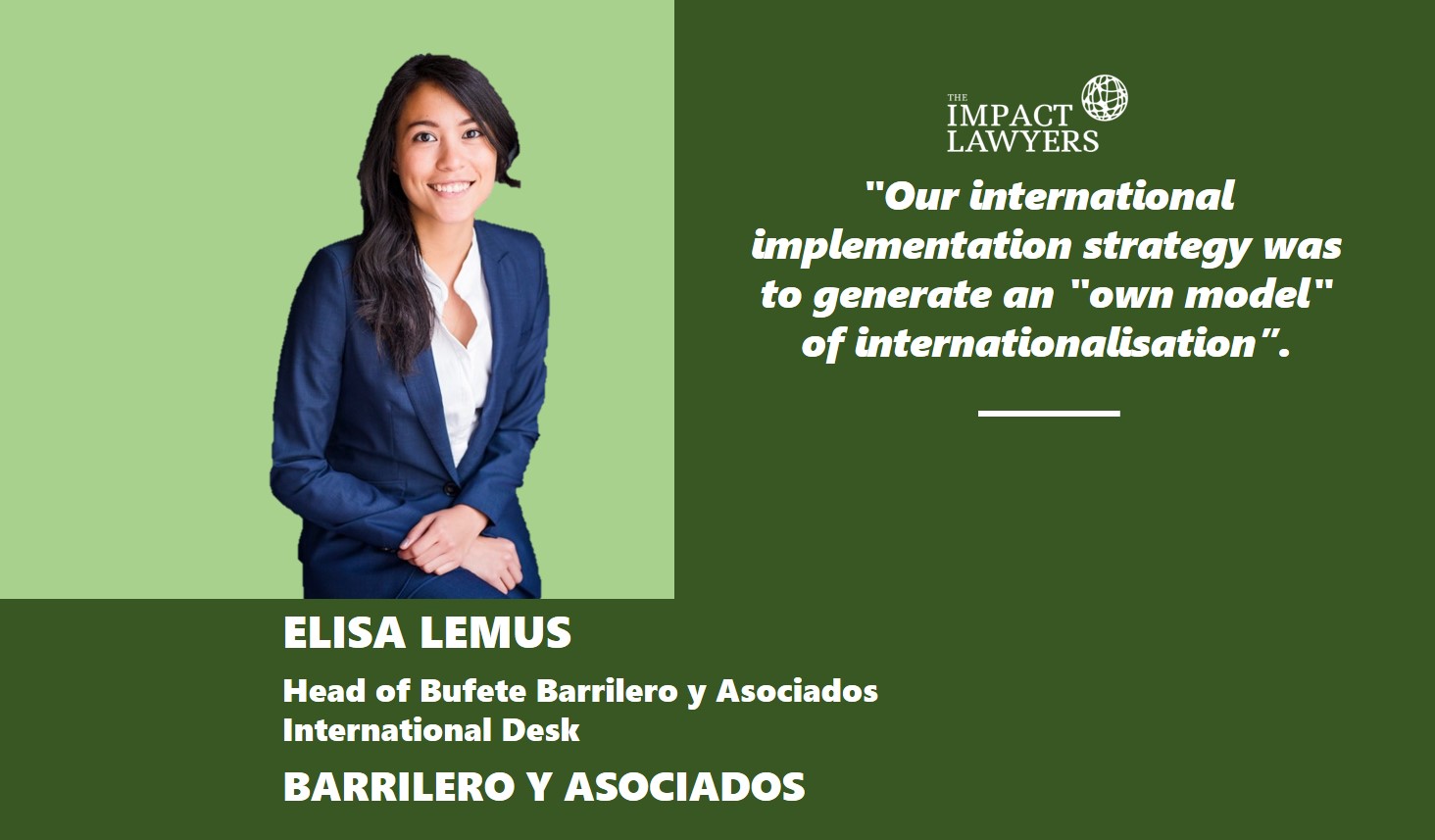
What is the strategy you have followed when opening offices abroad? Why?
Our international implementation strategy was to generate our own "own model" of internationalization. In this sense, respecting what others have done, we identified two previous models, to conclude in "our model":
OPTION 1.- OPENING OUR OWN OFFICES.- It was a strategy that we discarded from the beginning for two basic reasons:
1.- THE COSTS.- developing our own office structure means facing very important investments in order to maintain the quality standards of our firm.
2.- FOREIGNERS ANYWHERE - We have seen in person when visiting other countries and markets, that in many environments (mainly LATAM), Spanish law firms are viewed with reticence when trying to compete in their own countries with very good local law firms.
OPTION 2.- NETWORKS OF LAW FIRMS: The second strategy that we also discard is to join an INTERNATIONAL NETWORK where you do not really know the destination law firm and where pulling from the list is not always the best for our clients. According to our vision, belonging to an international NETWORK serves to cover the dossier, but does not respond to our model of understanding the legal profession.
OPTION 3.- OUR MODEL: Having discarded the classic formulas, we faced the exciting challenge of generating an "alliance of our own" based on express collaboration agreements with law firms previously approved by our firm. To this end, we visited all the law firms that we intended to select by country and, only after getting to know them personally and discarding other very valid options, we formalised the collaboration agreements with the law firms that we considered to be the closest to our firm.
As a result of this stage, we are currently in contact with a very important ALLIANCE, where we work as "Partners" and where we know each other personally. This allows us to ensure that when our clients have to travel to other countries, they are attended there as if we were ourselves, with reasonable prices and exquisite treatment, always being advised by professionals who are well-connected in each jurisdiction. Logically, this experience also happens in the opposite direction, when a client comes to us referred by our Partner.
Whichever model you have chosen to set up in a new jurisdiction, what are the biggest challenges you have faced?
We could talk about many challenges, but to simplify there are THREE basic ones:
- KNOWLEDGE OF THE LOCAL ENVIRONMENT - In our profession it is essential to know the local reality of the environment very well. It is not only a question of knowing the law, but above all, of knowing how to move in each country, with its advantages and disadvantages. This challenge was essential for us in order to guarantee the best quality for our clients and we are convinced that we have more than met it.
- VIP TREATMENT - At all times we have tried to ensure that our clients are treated as VIPs. If it is necessary to organise all the logistics, our partner firm will do so. If it is necessary to control and translate the legal direction, our international division will do so. In short, it is essential that our client receives the same treatment as in Spain.
- PRICES - Another issue that we have noticed from the beginning is that in many countries the lawyers' fees are much higher than in Spain. For this reason, we are normally the ones who settle the costs with our collaborating law firm, thus avoiding surprises for our clients.
How has the crisis caused by COVID-19 affected your international growth strategy?
Evidently, the international implementations and movements have slowed down, but in spite of this, we have continued to grow in the international division of the firm, which ratifies the success of our "own model".
AUREN
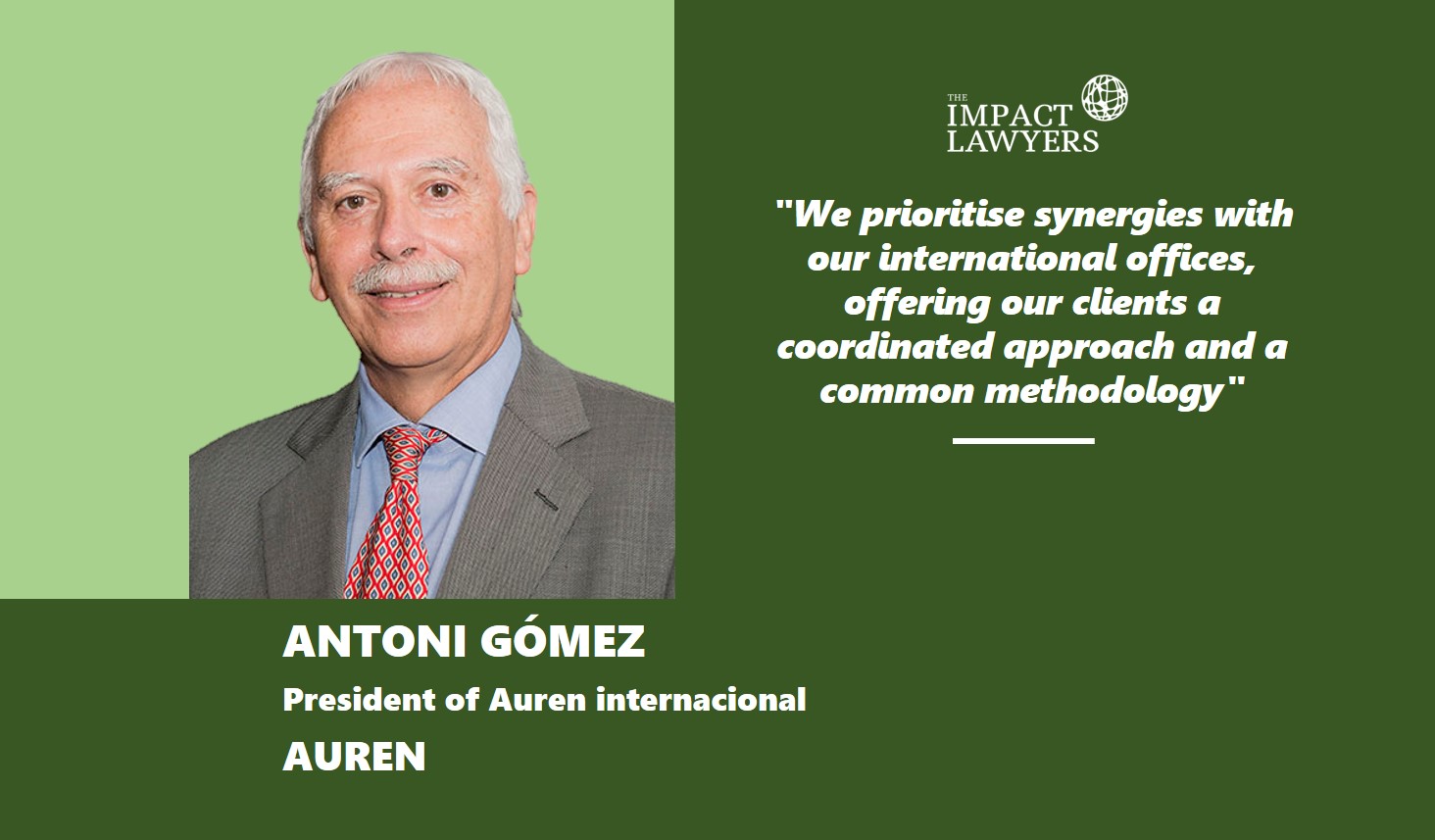
What is the strategy you have followed when opening offices abroad? Why?
We have given priority to regions and countries with which Spain has a special relationship, firstly, with Latin America and, secondly, with Europe. We have recently incorporated Israel, as there is a very significant flow of cross-interests and, despite being a relatively small economy, it is at the international forefront in many sectors and with a clearly international vocation.
We prioritise synergies with our international offices, offering our clients a coordinated approach and a common methodology. We cover jurisdictions in which we do not have a direct presence through Antea, the Alliance of Independent Firms that we have promoted and which is present in more than 75 countries. With our international offices, we seek a strategy of shared action.
Whichever model you have chosen to establish yourself in a new jurisdiction, what are the biggest challenges you have faced?
The cultural aspects. It is very important for us to share the same values, both internally, in terms of the relationship between partners and with our professionals, and externally, with our clients. The differences between countries and the backgrounds of local partners require intense attention, as it is not just a matter of transferring and sharing methodology, but also of ensuring that we apply common criteria and styles in all the places where we are present.
How has the COVID-19 crisis affected your international growth strategy?
The limitation of physical meetings has slowed down some integration talks that were significantly advanced, for example with Italy. The international conventions of Antea, our association of independent firms, are a key framework for discussing integration opportunities with some firms and, as a result of COVID-19, this year the meetings have been virtual, so such discussions have not been possible. We have had some other contacts in virtual format, but for us it is very important to share the experience of culture and values, as seen in exchanges between different people in the teams, which has not been possible at this juncture.
CECA MAGAN
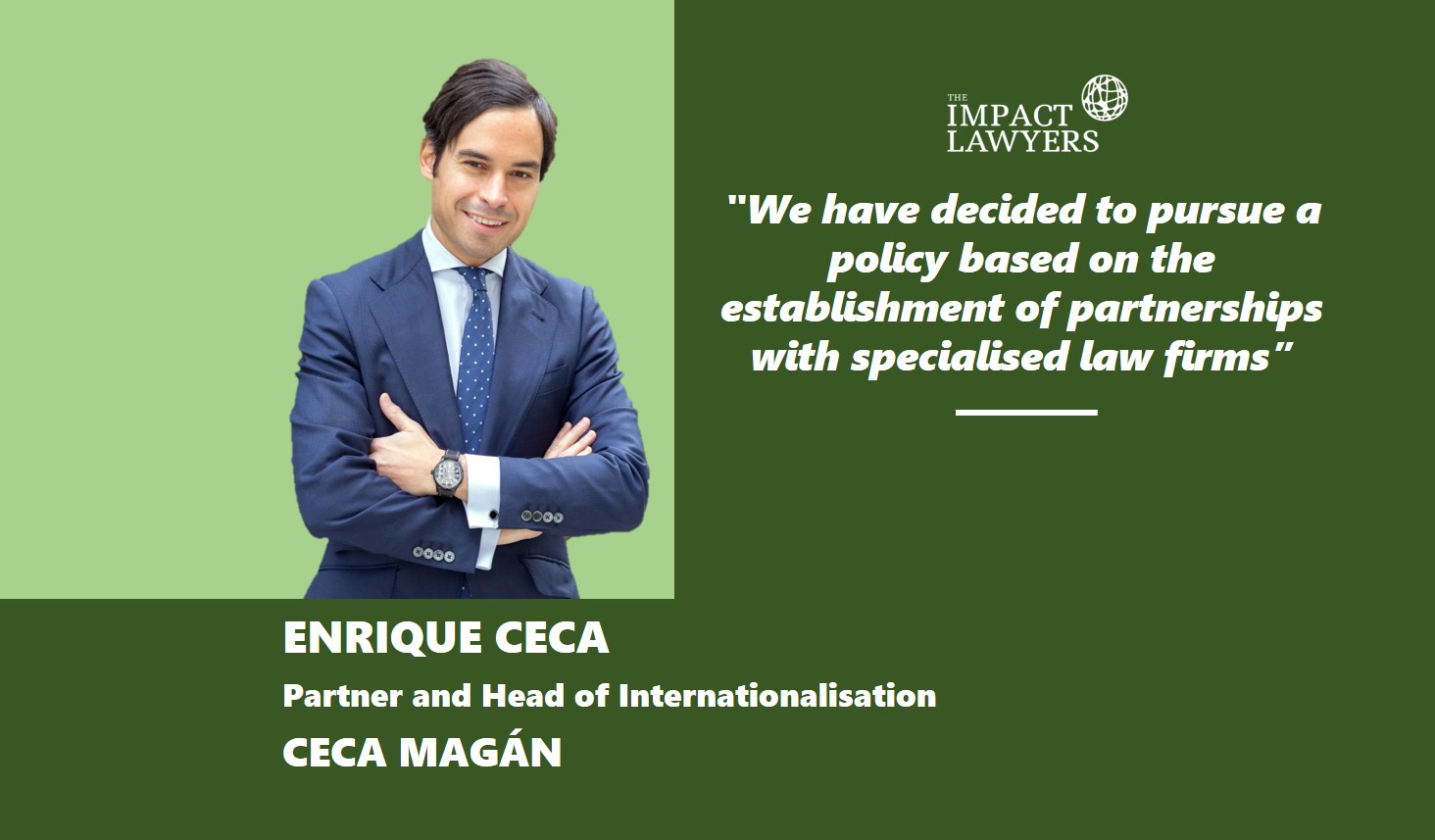
What is the strategy you have followed in internationalising the firm? Why?
At CECA MAGÁN we are clear that internationalisation is one of the key pillars of our growth and business model, which is why we have decided to opt for a policy based on establishing alliances with specialised law firms that provide an extraordinary quality service in the key areas required by our clients in their respective countries, and that share our business philosophy.
Having specific, value-added alliances in the countries of the world in which our clients have interests or business is the best way to ensure the best service for a law firm of our characteristics.
At the same time, thanks to our international partners, we are collaborating in the implementation and development of investment opportunities in Spain, and accompanying international clients in their business in our country.
Whichever model you have chosen to grow internationally, what are the biggest challenges you have faced?
The biggest challenge has been to ensure the quality of the advice provided by the local firm. For this, the alliance's recruitment and incorporation process is key.
On the other hand, quality must be accompanied by a lot of agility in the advice, especially in today's way of doing business. In order for clients who are used to our way of working to maintain the same speed of response in the management of their affairs, we carry out important coordination work from our law firm.
How has the COVID-19 crisis affected your international growth strategy?
The global pandemic has shown that the legal problems faced by companies internationally are very similar. For this reason, in our firm throughout the 2020 complex we have strengthened and greatly enhanced our service to our clients, joining the most relevant alliances on the global legal scene, such as First Law International (FLI) - Lawyers Associated Worldwide (LAW), and CELIA Alliance, and maintaining our presence in the CICERO alliance to which we have belonged since 2008.
Currently, our international coverage reaches more than 150 jurisdictions around the world.
LÓPEZ-IBOR
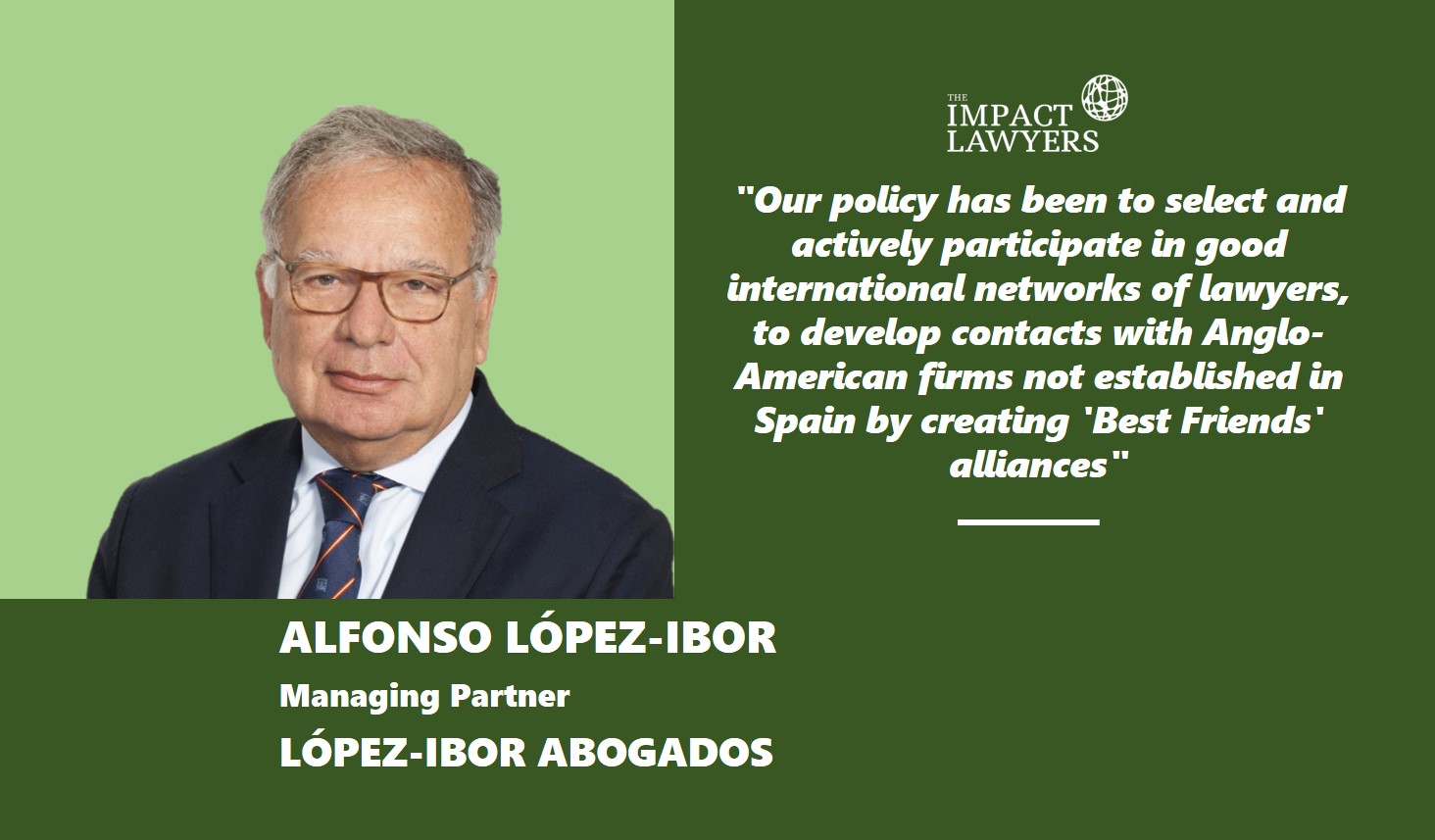
What is the strategy you have followed when internationalizing the firm? Why?
For us, the internationalization of the firm has always meant developing an international clientele in addition to our purely Spanish clientele. In fact, in recent years our international clients have come to represent more than 60% of our turnover. We consider this to be an anti-cyclical strategy, as it allows us to handle cases and maintain an acceptable level of activity in difficult times when our economy is suffering. In recessionary periods we lawyers have a lot of work, but big problems in getting paid due to the financial difficulties of local clients. Foreign firms investing in other countries tend to be financially stronger.
Obviously there is no single model. Our policy has been to select and actively participate in good international networks of lawyers, to develop contacts with Anglo-American firms not established in Spain by creating "Best Friends" alliances, to specialise in areas of law with a high international component and to participate in seminars and publications aimed at potential investors in Spain. For some years now we have also incorporated foreign lawyers, especially from Latin American countries, as a strategy to get closer to those countries that are becoming a source of international work.
We have not considered opening offices in other countries as this is very costly and has a slow maturation period. It would only be justified in the case of monitoring one or two Spanish clients with strong international expansion. But the truth is that opening offices abroad is currently only within the reach of large firms. In this sense, it would be very interesting if there were aid for medium-sized firms like ours, which already have an international projection.
However, we have the impression that the central government, through ICEX, the Community of Madrid and the Madrid Bar Association itself are beginning to be aware of the need for support, aid and subsidies, since Madrid's economy is essentially one of services and Madrid has very good law firms and excellent international lawyers.
Whichever model you have chosen to grow internationally, what are the biggest challenges you have faced?
In our strategy, perhaps the biggest challenge is organisational, in the sense of taking advantage of the opportunities that arise on a daily basis.
How has the crisis caused by COVID-19 affected your international growth strategy?
COVID-19 has dealt a huge blow to sectors where we have traditionally had a lot of work, such as hotels, aeronautics and real estate. However, we share the perception that the new vaccines will bring about a recovery of the world and European economies sooner rather than later.
In terms of our strategy, we have started to focus on advising digital businesses that are expected to grow strongly precisely because they are not face-to-face. From an internal organisational point of view, we are promoting teleworking for lawyers and staff as we had already invested in new systems before the pandemic. In the near future we plan to reduce the need for office space.
CREMADES & CALVO SOTELO

What strategy have you followed when opening offices abroad? Why?
We are in countries where there are two circumstances. The first is that there is an economic and social relationship between Spain and the country where we set up our offices. The second is that we find a team of lawyers we trust and who share our values, so that together we can pursue our purpose.
Whichever model you have chosen to establish in a new jurisdiction or to grow internationally, what are the biggest challenges you have faced?
Two are our biggest challenges. On the one hand, identifying great local professionals with whom we can collaborate in an environment that is inclusive, diverse and open to new ways of helping and serving clients who require our services. On the other hand, learning the culture and connecting with the different industries in each country to understand their needs and assess how we can add value to them.
How has the COVID-19 crisis affected your international growth strategy?
The health and economic consequences have substantially affected our internationalization strategy. Many of the trips organised in the development of our partnership strategy have been suspended or cancelled. However, we have also been able to test the effectiveness of videoconferencing and its ease of use. Adjusting to the new environment we have to live with was difficult at the beginning, but we have gradually been able to meet our 2020 and 2021 targets and even exceed them. We are now more connected to industries and lawyers in other countries than probably at any other time in our almost 25-year history as a law firm.
This survey was conducted through Venize Comunicación between December 2020 and January 2021.
Related links
Main menu



